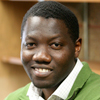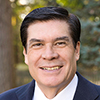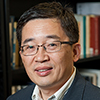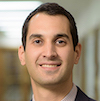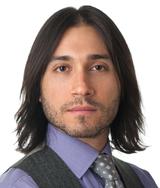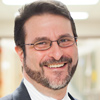Research / Areas of ResearchBiosystems and Health
Advancing basic and translational research to address critical healthcare issues and answer fundamental biological questions at scales from molecules to systems
 From molecular mechanics to multiscale physiological simulations to the control of prosthetic limbs, mechanical engineering helps develop technologies that improve human health and offers insights into fundamental biological processes. In close collaboration with the Feinberg School of Medicine and the Shirley Ryan AbilityLab, the nation's #1 rehabilitation research hospital, we address pressing healthcare challenges.
From molecular mechanics to multiscale physiological simulations to the control of prosthetic limbs, mechanical engineering helps develop technologies that improve human health and offers insights into fundamental biological processes. In close collaboration with the Feinberg School of Medicine and the Shirley Ryan AbilityLab, the nation's #1 rehabilitation research hospital, we address pressing healthcare challenges.
View biosystems and health faculty
![]()
Research Area Subtopics

improve safety. (B. Argall)
Human-robot Systems
Design of effective human-robot systems requires a deep understanding of human motor control and psychophysics. Working with our partners at the medical school and the Shirley Ryan AbilityLab, we are advancing the state of the art in human-robot systems in areas such as haptic interfaces, advanced prosthetics, rehabilitation robots, and robots for safe physical collaboration with humans (“cobots,” a term coined in our department).

stretchable radios. (F. Frankel, J. Rogers)
Bioelectronics
Bioelectronic devices enable the transparent integration of flexible, biological tissue with silicon-based electronics. Applications of this interface of biology with technology are numerous, including wireless skin-like wearable sensors and actuators, resorbable electronics, and targeted drug delivery.

medicine. (H.D. Espinosa, J. Kessler, and P. Mukherjee)
Cell Therapy
We are advancing the science and engineering of integrated microfluidic platforms for gene editing and live cell analysis. By combining single-cell RNA sequencing and machine learning lineage tracing with non-destructive temporal measurement of signaling proteins, an unprecedented detailed molecular landscape of desired lineage specifications is being constructed. We target applications in disease modeling, drug screening, immunology, and other cell therapies.

microscopy. (H.D. Espinosa, K. Green)
Mechanics of Biosystems
New computational methods are being developed to study complex dynamics of biological systems to better understand biological processes and treat diseases. We aim to shift the existing paradigm of studying disease pathogenesis of organs toward a biomechanics-based approach. We aspire to create new phenotypic classifications and diagnostic platforms with a focus on quantitative mechanics-based physiomarkers (esophagus, heart, lungs).

stimulation neuroprosthesis. (K. Lynch, E. Schearer)
Sensorimotor Control
Using approaches including neuromechanics, information theory, neurophysiology, psychophysics, and synthetic data generation, our work aims to reveal fundamental sensorimotor principles that guide perception, action, and cognition in humans and animals, and to apply these principles to the design and control of novel robots and assistive devices.
![]()
ME Faculty
Brenna Argall
Professor of Computer Science
Professor of Mechanical Engineering
Professor of Physical Medicine and Rehabilitation
Oluwaseyi Balogun
Associate Professor of Civil and Environmental Engineering and Mechanical Engineering
J. Edward Colgate
Walter P. Murphy Professor of Mechanical Engineering
Director, NSF Engineering Research Center on Human AugmentatioN via Dexterity (HAND)
Horacio Espinosa
James N. and Nancy J. Farley Professor in Manufacturing & Entrepreneurship
Director, Theoretical and Applied Mechanics Program
Director of the Institute for Cellular Engineering Technologies
Professor of Mechanical Engineering and (by courtesy) Biomedical Engineering and Civil and Environmental Engineering
Mitra Hartmann
Professor of Biomedical Engineering
Professor of Mechanical Engineering
Professor of Computer Science (by courtesy)
Yonggang Huang
Jan and Marcia Achenbach Professorship in Mechanical Engineering, Civil and Environmental Engineering, and (by courtesy) Materials Science and Engineering
Sinan Keten
Jerome B. Cohen Professor of Engineering
Professor of Mechanical Engineering and Civil and Environmental Engineering and (by courtesy) Biomedical Engineering
Associate Chair of Mechanical Engineering
Matthew J. Major
Associate Professor of Physical Medicine & Rehabilitation
Biomedical Engineering
and (by courtesy) Mechanical Engineering
Director of the Masters in Prosthetics and Orthotics Research Program
Todd Murphey
Professor of Mechanical Engineering
Director of the Master of Science in Robotics Program
Director of Transformative Research
Neelesh Patankar
Professor of Mechanical Engineering and (by courtesy) Engineering Sciences and Applied Mathematics
Director, NAISE
Michael Peshkin
Professor of Mechanical Engineering
Allen K. and Johnnie Cordell Breed Senior Professor in Design
Ryan Truby
Assistant Professor of Materials Science and Engineering
Assistant Professor of Mechanical Engineering
June and Donald Brewer Junior Professor
Gregory Wagner
Associate Professor of Mechanical Engineering
Director of Graduate Studies for Mechanical Engineering
Courtesy Faculty
Michael Miksis
Professor of Engineering Sciences and Applied Mathematics and (by courtesy) Mechanical Engineering
Director of MS Studies for Engineering Sciences and Applied Mathematics
Aaron Packman
Professor of Civil and Environmental Engineering and (by courtesy) Mechanical Engineering and Chemical and Biological Engineering
John Rogers
Louis Simpson and Kimberly Querrey Professor of Materials Science and Engineering, Biomedical Engineering and Neurological Surgery (and by courtesy Electrical and Computer Engineering, Mechanical Engineering, Chemistry and Dermatology)
Director, Querrey Simpson Institute for Bioelectronics
Petia Vlahovska
Professor of Engineering Sciences and Applied Mathematics and (by courtesy) Mechanical Engineering


